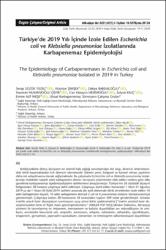| dc.contributor.author | Süzük Yıldız, Serap | |
| dc.contributor.author | Şimşek, Hüsniye | |
| dc.contributor.author | Bakkaloǧlu, Zekiye | |
| dc.contributor.author | ... | |
| dc.contributor.author | Sezgin, Fikriye Milletli | |
| dc.contributor.author | Karahan, Zeynep Ceren | |
| dc.contributor.author | Duman, Yücel | |
| dc.date.accessioned | 2025-03-05T07:15:23Z | |
| dc.date.available | 2025-03-05T07:15:23Z | |
| dc.date.issued | 2021 | en_US |
| dc.identifier.citation | Süzük Yildiz, S., Şimşek, H., Bakkaloǧlu, Z., Numanoǧlu Çevik, Y., Hekimoǧlu, C., Kiliç, S., ... & Karahan, Z. (2021). The epidemiology of carbapenemases in escherichia coli and klebsiella pneumoniae isolated in 2019 in Turkey Türkiye'de 2019 Yili Içinde Izole Edilen Escherichia coli ve Klebsiella pneumoniae Izolatlarinda Karbapenemaz Epidemiyolojisi. Mikrobiyoloji Bulteni, 55(1). | en_US |
| dc.identifier.issn | 03749096 | |
| dc.identifier.uri | https://10.5578/MB.20124 | |
| dc.identifier.uri | https://hdl.handle.net/20.500.12513/7146 | |
| dc.description.abstract | Antibiotic resistance is one of the most important public health problem and one of the most critical steps in preventing resistance is the monitorization of the resistance. Local, regional and global monitoring enables the spread of antibiotic resistance to be understood more clearly. In this study, it was aimed to evaluate the results of the pilot study for the establishment of molecular-based carbapenem surveillance system in Escherichia coli and Klebsiella pneumoniae isolates and to investigate the carbapenemase epidemiology in Turkey. Hospitals (n= 28) from 26 different statistical level II regions from Turkey were included in the study. The hospitals participated in the study submitted ten carbapenem susceptible and ten carbapenem resistant E.coli and K.pneumoniae isolates to our laboratory that were isolated in two different periiods of six-month either between 1 March-31 August or 1 April-30 September 2019. A total of 509 isolates were collected from 26 of the 28 participating hospitals in the study. Isolates were identified by matrix assisted laser desorptionization-time of flight mass spectrophotometry (MALDI TOF MS) (Bruker Daltonics, Germany) method and antibiotic susceptibility tests for imipenem, meropenem and colistin were studied by broth microdilution. Moreover, susceptibilities to amikacin, amoxicillin-clavulanic acid, ampicillin, aztreonam, cefepime, cefotaxime, ceftazidime, ciprofloxacin, ertapenem, gentamicin, piperacillin-tazobactam, tobramycin and trimethoprim-sulfamethoxazole were determined by disc diffusion method. The resistance genes were investigated in isolates which were found to be phenotypically resistant to carbapenem and colistin, in house method was used to investigate carbapenemase genes and a commercial colistin resistant real-time PCR kit (Biospeedy, Turkey) was used for colistin resistance genes. In total, 493 of the 509 isolates collected from hospitals were identified as E.coli (25.7%, n= 127) and K.pneumoniae (74.3%, n= 366) and included in the study. It was determined that 31% of the isolates evaluated were from community-acquired infections and 69% were either from healthcare-associated infections or from colonization sites. Among the tested isolates, 248 (50.3%) were susceptible to carbapenems and 245 (49.7%) were resistant. The types of carbapenemases in carbapenemase-producing isolates were OXA-48 (52.2%), KPC (16.1%), NDM-1 (15%), OXA-48 + NDM-1 (12.6%), KPC + NDM-1 (2.8%) and VIM (0.5%) and OXA-48+VIM (0.5%). Resistance to colistin was detected in 23.3% of the isolates but mcr1-8 genes were not detected. It was found that all colistin resistant isolates are resistant to at least one of the carbapenems. The importance of a molecular-based antimicrobial resistance surveillance system in our country was demonstrated with this pilot study. It is thought that continuous monitoring of these epidemiological features will contribute to the management of infections due to carbapenemase-producing organisms. © 2021 Ankara Microbiology Society. All rights reserved. | en_US |
| dc.language.iso | tur | en_US |
| dc.publisher | Ankara Microbiology Society | en_US |
| dc.relation.isversionof | 10.5578/MB.20124 | en_US |
| dc.rights | info:eu-repo/semantics/openAccess | en_US |
| dc.subject | Carbapenemase | en_US |
| dc.subject | E.coli | en_US |
| dc.subject | K.pneumoniae | en_US |
| dc.subject | Surveillance System | en_US |
| dc.title | The Epidemiology of Carbapenemases in Escherichia Coli and Klebsiella Pneumoniae İsolated in 2019 in Turkey [Türkiye'de 2019 Yili Içinde Izole Edilen Escherichia coli ve Klebsiella pneumoniae Izolatlarinda Karbapenemaz Epidemiyolojisi] | en_US |
| dc.type | article | en_US |
| dc.relation.journal | Mikrobiyoloji Bulteni | en_US |
| dc.contributor.department | Tıp Fakültesi | en_US |
| dc.contributor.authorID | Fikriye Miletli Sezgin / 0000-0002-8317-2312 | en_US |
| dc.identifier.volume | 55 | en_US |
| dc.identifier.issue | 1 | en_US |
| dc.identifier.startpage | 1 | en_US |
| dc.identifier.endpage | 16 | en_US |
| dc.relation.publicationcategory | Makale - Uluslararası Hakemli Dergi - Kurum Öğretim Elemanı | en_US |


















